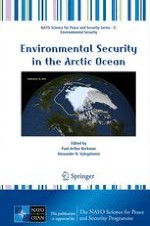2013 | OriginalPaper | Buchkapitel
6. Sustainable Development Considerations in the Arctic
verfasst von : Nikolaj Bock
Erschienen in: Environmental Security in the Arctic Ocean
Verlag: Springer Netherlands
Aktivieren Sie unsere intelligente Suche, um passende Fachinhalte oder Patente zu finden.
Wählen Sie Textabschnitte aus um mit Künstlicher Intelligenz passenden Patente zu finden. powered by
Markieren Sie Textabschnitte, um KI-gestützt weitere passende Inhalte zu finden. powered by
